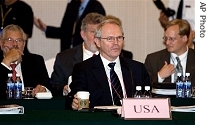2007年VOA标准英语-Working Group Focuses on 'Technical Details' of(在线收听)
Beijing
16 August 2007
The chief U.S. negotiator at the North Korean nuclear talks says negotiators are discussing the "technical procedures" that would eventually be used to shut down the North's nuclear weapons programs. The talks in the Chinese city of Shenyang are in preparation for the next full round of six-nation talks on ending Pyongyang's nuclear capabilities. Daniel Schearf reports from Beijing.
 |
| U.S. envoy Christopher Hill, center, sits with his delegate members attending the 2nd working group meeting on North Korea's nuclear program in Shenyang, China, Thursday, 16 Aug 2007 |
"The purpose is not so much to negotiate an agreement today or this week, but rather to identify the technical procedures that can be used to affect disablement, and so we hope that if we can have an agreement on what type of technical procedures can be used, then we can put together an actual agreement," Hill said.
In February, the six-nation talks produced a broad agreement on North Korea's nuclear disarmament, and preliminary steps have already been taken. But the painstaking details of identifying and shutting down all of Pyongyang's nuclear programs have yet to be worked out.
Hill says this week's working group talks will lay the groundwork for the next full round of six-nation negotiations, which are expected to be held in Beijing in early September. China, South Korea, Japan and Russia are also involved in the talks.
The goal of the next round is a timetable for North Korea to reveal the full range of its nuclear programs, and details on how and when they will be disabled.
Pyongyang in July allowed international inspectors to verify the shutdown of its main plutonium nuclear reactor, the first step in what negotiators warn will be a lengthy process.
The February agreement calls for North Korea to eventually receive a total of one million tons of fuel, other types of aid, security guarantees and diplomatic concessions - as long as it follows its promise to declare and dismantle those nuclear programs.
North Korea's economy is in tatters, and long-running food shortages have led to widespread malnourishment and death among the population. Those problems were aggravated in recent weeks by flooding that Pyongyang says has killed hundreds of people, and affected up to 300,000.
The United Nations, South Korea and the U.S. are all are considering what humanitarian aid they can offer North Korea.